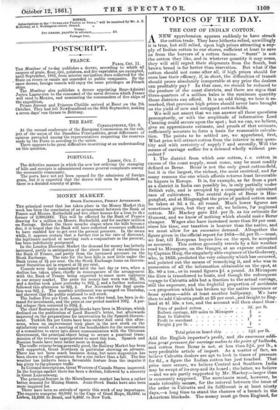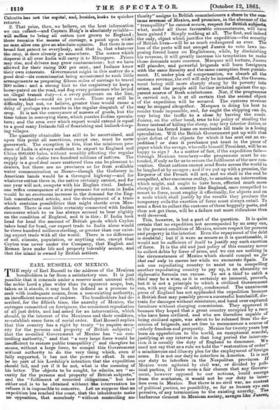TOPICS OF THE DAY.
THE COST OF INDIAN COTTON.
ANEW apprehension appears suddenly to have struck the cotton trade. They have hitherto relied, unwillingly it is true, but still relied, upon high prices attracting a sup- ply of Indian cotton to our shores, sufficient at least to save us from the horrors of a cotton famine. "Surat" is not the cotton they like, and in whatever quantity it may come, they will still regret their shipments from the South, but brown bread is far better than starvation. But what if the cotton should not come after all, if high prices should for once lose their efficacy, if, in short, the difficulties of transit should prove absolutely insuperable at any price the dealers can profitably pay ? In that case, we should be reduced to the produce of the coast districts, and there are signs that three-quarters of a million bales is the maximum quantity those districts can afford. It is an odd thing, we hear it re- marked, that previous high prices should never have brought us the yield of new and untapped cotton-fields. We will not assert that we can answer all these questions peremptorily, or with the amplitude of information Lord Canning could secure upon the spot ; but we can, we believe, give an approximate estimate, and proofs of that estimate, sufficiently accurate to form a basis for reasonable calcula- tion. The points to be settled are, we apprehend, first, What price will attract cotton from the interior in any quan- tity and with certainty of supply ? and secondly, Will the means of carriage suffice for a demand wholly without pre- cedent?
1. The district from which new cotton, i. e. cotton in excess of the coast supply, must come, may be most readily defined as Berar. Berar is not the only great cotton-field, but it is the largest, the richest, the most centrical, and for many reasons the one which affords returns least favourable to buyers in Europe. It is, for example, as far from a port as a district in India can possibly be, is only partially under British rule, and is occupied by a comparatively untrained race of cultivators. The central depot of Berar is Hin- gungliat, and at Hingunghat the price of packed cotton must be taken at 3d. a lb. all round. Much lower figures are sometimes given, but they are all, we believe, P-ir luginned cotton. Mr. Mackey gave 21d. per lb. as his esiimate for Guzerat, and we know of nothing which should make Berar cheaper. Wages also have increased more than 50 per cent. since his time, our taxation is heavier than the native, and we must allow for an excessive demand. Altogether the figure given in the official report for 1854-3d. per lb.—must, we fear, till European buyers live on the spot, be accepted as accurate. This cotton generally travels by a fair weather road to Mirzapore, on the Ganges, at an expense estimated by Captain Haig, the singularly able engineer of the Godavery, who, in 1856, predicted the very calamity which has occurred, and pointed out the means of remedying it, and who was in possession of all the information obtainable on the spot, at Rs. 80 a ton., or in round figures id. a pound. At Mirzapore the fibre is transferred to boats, and though the subsequent voyage to Calcutta adds but a fraction to the actual carriage, still the exposure, and the frightful proportion of accidents —a proportion which has broken up the native insurance or bema system—adds at least another halfpenny. We have then to add Calcutta profit at 25 per cent., and freight to Eng- land at 4/. 10s. a ton, and the account will then stand thus : Price of packed cotton 3d per lb.
Bullock carriage, 420 miles to Mirzapore . .
Boat to Calcutta
31
Profit to merchant 1 „
Freight I per lb. I 11 Total price on board ship . . . . 51d. per lb.
Add the English importer's profit, and the enormous addi- tion great pressurefor carriage makes to the price of bullocks, and cotton from Berar is not, at less than bid. per lb., a very profitable article of import. As a matter of fact, we believe Calcutta dealers are apt to look in times of pressure for 6d., a figure the Indian cotton has just touched. That price once secure, we believe Central and Southern India may be swept of its crop and its hoard ; the latter, we believe —and we are partly supported by Mr. Mackey—larger than is commonly supposed. The merchants must, however, be made tolerably secure, for the interval between the issue of the order in Calcutta and its fulfilment is at least ninety days,—a long time to stand the chances of a breach in the American blockade. The money must go from England, for Calcutta has not the capital, and besides, looks to quicker returns: 2. That price, then, we believe, on the best information we can col d Captain Haig's in absolutely reliable— will suffice to bring all cotton now grown to England ; there remains the means of carriage, a point upon which no man alive can give Ail absolute opinion. But there is one broad fact patent to everybody, and that is, that whatever the crop, it does already go somewhere. The means which disperse it all over India will carry it to Mirzapore. _Prices may rise, and drivers may grow contumacious ; but we have allowed for their rising 200 per cent., and Indians know their own interests. Government might in this matter do a good deal—its commissariat being accustomed to such little arrangements as preparing fifteen miles of carriage to travel 200 miles : and a strong hint to the magistracy to keep a horse-patrol on the road, and flog every policeman who levied an illegal transit e. every policeman on the line, unless watched—would do yet more. There may still be difficulty, but not, we believe, greater than would cause a delay of perhaps two months in the regular despatch of the crop. It is not the conveyance of masses of goods, but the time taken in conveying them, which puzzles Indian specula- tors; and the area over which export would extend is equal to a good many Irelands full of flourishing and bullock-keep- ing villages. The quantity obtainable has still to be ascertained, and upon this point all assertions, except one, must be mere guesswork. The exception is this, that the minimum pro- duce of India is always sufficient to export to England and China 600,000 bales, without sensibly affecting the regular supply left to clothe two hundred millions of natives. The supply is a good deal more scattered than can be pleasant to dealers, but there are no provinces so far from available water communication as Berar--though the Godavery in American hands would be a thronged highway—and for whatever cotton there is, the native certainly cannot, and for one year will not, compete with his English rival. Indeed, one reflex consequence of a real pressure for cotton in India would be an enormous increase in the demand for the Eng- lish manufactured article, and the development of a trade which contains possibilities that might startle even Man- chester. There is one little certainty connected with Indian commerce which to us has always seemed to bear slightly on the condition of England, and it is this : If India took head for head the amount of British goods which Ceylon takes head for bead, our export trade to India alone would be three hundred millions sterling, or greater than our exist- ing export trade with all the world. There is no difference of soil, climate, population, or anything else, except that Ceylon was never under the Company, that English and Roman laws make life and property tolerably secure, and that the island is owned by British settlers.































 Previous page
Previous page